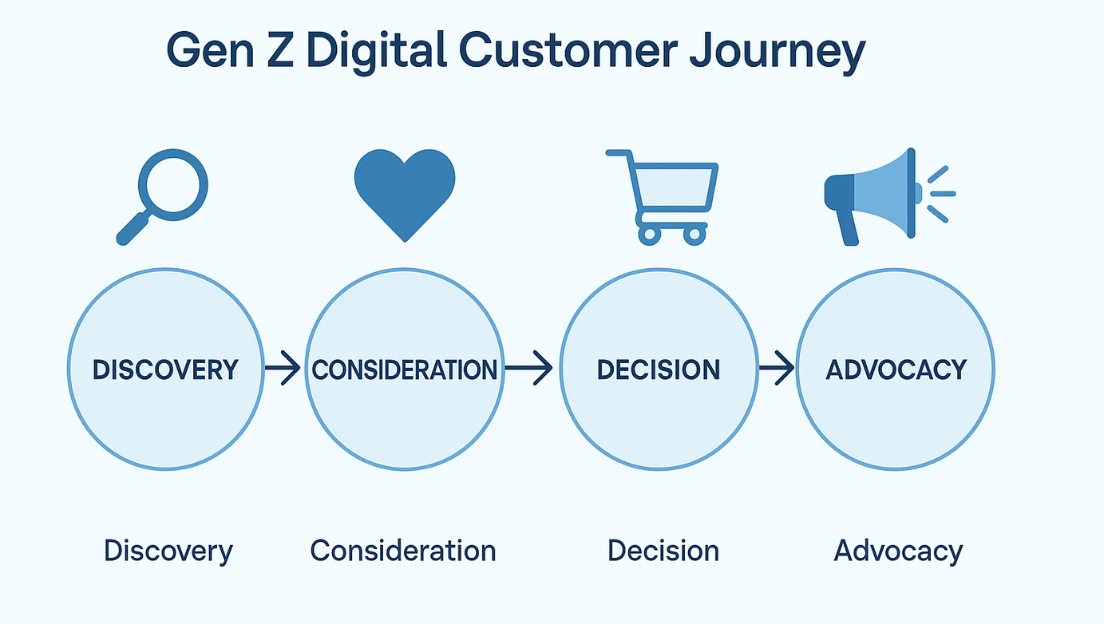Introduction
Gen Z—those born between 1997 and 2012—are rewriting the digital marketing playbook. With their mobile-first habits, preference for authenticity, and appetite for short-form content, brands must evolve or risk becoming irrelevant. This blog explores how Gen Z digital marketing trends are reshaping online strategies globally, impacting everything from influencer engagement to social commerce and branding.
The Gen Z Digital Mindset
Always Connected, Always Discerning
Unlike previous generations, Gen Z has never known a world without the internet. They’re digital natives who:
- Spend over 8 hours daily on screens
- Prefer video over text (especially TikTok, YouTube Shorts, Instagram Reels)
- Are skeptical of traditional ads and scripted influencer promos
- Seek transparency, value alignment, and community
Purpose Over Product
For Gen Z, what a brand stands for often outweighs what it sells. Brands that demonstrate social responsibility, diversity, and sustainability win loyalty.
Example: Nike’s “You Can’t Stop Us” campaign emphasized inclusion and perseverance, resonating deeply with Gen Z.
Key Gen Z Digital Marketing Trends
1. Authentic Branding Over Polished Narratives
- Gen Z craves realness. Instead of glossy ads, they prefer:
- Behind-the-scenes content
- User-generated posts
Candid storytelling by employees or real customers
Case in Point: Duolingo’s cheeky, unfiltered TikTok mascot has turned the brand into a Gen Z icon—without massive ad spend.
2. Influencer Marketing 2.0
Traditional influencer marketing is losing its shine. Gen Z favors:
- Micro-influencers with niche audiences
- Peer recommendations over celebrities
- Long-term ambassador programs, not one-off sponsorships
Key Insight: Trust and relatability matter more than follower count.
3. Social Commerce Is Mainstream
Buying directly from social platforms is second nature to Gen Z. Platforms like Instagram, TikTok, and YouTube have streamlined shopping integrations.
Trends:
- Shoppable live streams
- Influencer product demos
- Native checkout features
Stat: Over 60% of Gen Z in the US and India have purchased through social media links in the past 6 months.
4. Short-Form Video Is King
Short, snackable content drives attention and conversion. This format dominates Gen Z feeds and is a key strategy for retention.
Best Practices:
- Hook within 3 seconds
- Caption for silent scrolling
- Encourage comments and duets (on TikTok)
5. AI-Powered Personalization
Gen Z expects personalized experiences. Brands are leveraging AI to:
- Curate dynamic product recommendations
- Auto-generate personalized DMs and emails
- Create hyper-targeted TikTok ad variations
Example: Netflix’s AI-tailored thumbnails and content suggestions keep Gen Z viewers engaged.
Global Brands Adapting to Gen Z
Netflix
- Uses meme culture and pop-culture humor to promote new shows
- Relies on regional influencers for local appeal
Nike
- Highlights athlete stories over product specs
- Integrates purpose-driven themes like mental health and equity
Duolingo
- Builds community through viral humor
- Responds to comments, uses trends, and showcases brand personality
Gen Z Digital Platforms and Brand Opportunities
| Platform | Purpose | Brand Opportunity |
|---|---|---|
| TikTok | Entertainment, expression | Organic, trend-based storytelling |
| Visual inspiration | Shoppable posts, influencer collabs | |
| YouTube Shorts | Edutainment | Quick tutorials, product demos |
| Discord | Community and niche groups | Brand-run servers, direct feedback |
| Snapchat | Friends and micro content | Geo-filters, native ads |
The Gen Z Customer Journey (Flow Diagram Suggestion)

- Awareness: TikTok Trend or Meme
- Interest: Influencer review or UGC
- Consideration: Peer Reddit threads or Instagram comments
- Purchase: Direct from social commerce store
- Post-Purchase: Brand tagged on Stories + feedback via DMs
Frequently Asked Questions (FAQ)
Q1: How is Gen Z influencing digital marketing strategies?
A: Gen Z’s demand for authenticity, personalization, and purpose-driven content is pushing brands to shift away from polished campaigns toward real, community-driven narratives.
Q2: What platforms are most effective for marketing to Gen Z?
A: TikTok, Instagram, and YouTube Shorts dominate. Discord is emerging for community-based engagement.
Q3: What makes Gen Z different from millennials in digital behavior?
A: Gen Z prefers video-first content, cares more about social impact, and is quicker to dismiss brands that feel inauthentic.
Q4: How should brands approach influencer marketing for Gen Z?
A: Partner with micro-influencers and prioritize long-term relationships based on shared values, not just product placement.
Q5: What type of content performs best with Gen Z?
A: Short-form, unscripted, visually engaging content that sparks interaction or humor.
Conclusion
Gen Z isn’t just another demographic—they’re a digital revolution. Their expectations have forced brands to rethink everything from tone of voice to where and how they show up online. Marketers who can decode Gen Z digital marketing trends will gain more than visibility—they’ll earn trust, loyalty, and long-term relevance.
Stay ahead in the digital race—revamp your marketing playbook with Gen Z preferences in mind and build loyalty that lasts.



